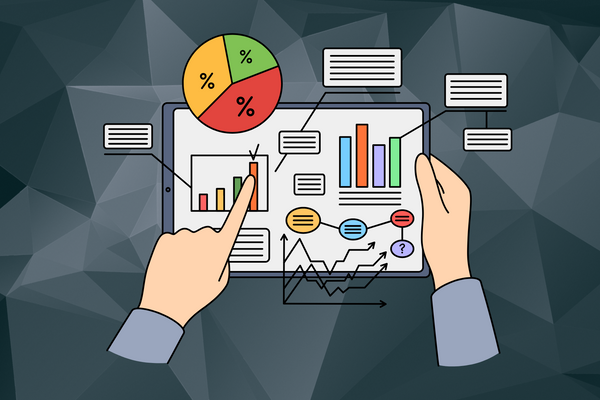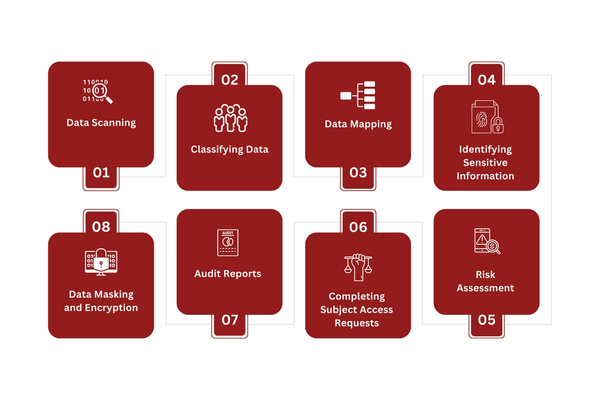
If you operate in Brazil or handle the personal data of Brazilians, you’re probably familiar with the nation’s comprehensive privacy law, Lei Geral de Proteção de Dados (LGPD).
Ensuring compliance with the LGPD is no small feat, thanks to its stringent requirements. At the heart of this endeavor lies the concept of “Data Discovery.”
This article will help you jumpstart your LGPD compliance process by offering insights and practical steps to leverage data discovery effectively.
Let’s get started!
Key Takeaways
Data discovery is a vital starting point for ensuring compliance under Brazil’s LGPD. It helps organizations identify, manage, and protect personal and sensitive data.
Leveraging an industry-standard data discovery tool is a wise move for businesses of all sizes. It allows you to automate data discovery, making it efficient and error-free.
If data discovery reveals non-compliance with the LGPD, you need to promptly take corrective measures to protect your business from fines and reputational damage.
What is Data Discovery?
What is Data Discovery.png

Data discovery is the systematic process of identifying, locating, and classifying the data residing within your organization. Think of it as shining a spotlight into the dark corners of your organization’s ecosystem to gain valuable insights about your data assets.
Data discovery is especially important for developing a corporate compliance program and complying with data privacy laws like the GDPR, CPRA, and LGPD. After all, you can’t attempt to protect personal data without learning where it resides within your organization.
Note: Under data privacy laws, personal data generally means any information that can identify a natural person, such as:
Names
Phone numbers
Home and email addresses
Social security numbers
Financial information
Online identifiers (cookies, pixels, IP addresses, etc.)
Since organizations often have a vast amount of data scattered across multiple systems and locations, data discovery can be a complex process. Fortunately, numerous tools and software are available today to help businesses automate and streamline the data discovery process.
Ultimately, data discovery empowers you to make informed decisions for effective data governance, privacy practices, and, of course, compliance with privacy laws like the LGPD.
Why is Data Discovery Important for the LGPD?
The LGPD is a landmark data privacy law in Brazil that requires businesses to uphold strict data protection standards. To observe the LGPD requirements, organizations must understand their data management practices through the art of data discovery.
Let’s take a closer look at why data discovery is vital for your LGPD compliance efforts:
Identify Risks and Compliance Gaps
Implementing data discovery allows you to proactively identify data privacy risks and compliance gaps.
Through data scans and catalogs, you can accurately pinpoint risks and develop measures to address them before they escalate into regulatory violations or security breaches.
Ensure Accurate Data Records
Data discovery helps you maintain the accuracy and integrity of your data records. You can eliminate outdated information, duplicates, and inconsistencies by regularly monitoring and updating data repositories. This enhances the quality of your data and its utility for decision-making.
Facilitate Data Subject Rights
Data discovery allows you to fulfill data subject rights under the LGPD quickly. Specifically, you can swiftly locate and give data subjects access to their information. You can also rectify inaccuracies and delete information (relatively quickly) upon request.
Assist with Data Protection Impact Assessments (DPIAs)
Data discovery simplifies the process of conducting DPIAs – a crucial requirement under the LGPD and similar regulations.
Since data discovery automatically identifies and assesses high-risk data processing activities, you can prioritize efforts, address privacy issues, and mitigate risks more effectively.
Quick Breach Incident Response
In the event of a data breach, time is of the essence. Data discovery allows you to locate compromised data quickly, assess the extent of the breach, and take immediate action to contain and report the incident.
In doing so, you not only minimize damage to consumers but also adhere to the data breach notification requirements under the LGPD by reporting the incident in a reasonable timeframe.
Optimize Resource Allocation
Data discovery also helps you allocate resources more effectively. When you understand the scope and location of data in your ecosystem, you can send resources where they are most needed and reduce unnecessary costs.
Enhance Business Decision-Making
Data discovery not only serves compliance purposes but also enhances your ability to make informed business decisions.
With a comprehensive view of your data inventory, you can effectively leverage information as a strategic asset to drive innovation and competitiveness.
What Does a Data Discovery Tool Do?
What Does a Data Discovery Tool Do.png

A data discovery tool is a software partner in the pursuit of LGPD compliance. It locates, classifies, and maps data across your organization, revealing useful insights and enhancing privacy protection.
For the most effective results, we recommend outsourcing compliance to leading data discovery tools like Captain Compliance, Informatica, Osano, and PII Tools (to mention a few).
Now, let’s go over the essential functions of data discovery tools:
Data Scanning
Data discovery tools scan your entire digital warehouse, including databases, cloud storage, files, servers, and even shadow IT systems, to pinpoint all data instances. A comprehensive sweep ensures no data remains hidden or unaccounted for.
Classifying Data
After a thorough scan, data discovery tools categorize your organization’s data based on predefined criteria, such as:
Data type (financial, health, geolocation, etc.)
Origin (cloud storage, email servers, IoT devices, social media, etc.)
Level of sensitivity (high, moderate, low)
Effective classification provides a clear picture of the data you’re handling and helps you determine how much protection each data category requires.
Data Mapping
Data discovery tools create visual maps or diagrams of how data flows through your organization. With these insights, you can better understand the movement of data, who has access to it, and how it’s used.
Data mapping is also instrumental in understanding data lifecycles and facilitating effective data governance.
Identifying Sensitive Personal Information (SPI)
An effective data discovery excels at identifying sensitive personal information (SPI). Under the LGPD, SPI includes the following:
Racial or ethnic origin
Religious belief
Political opinion
Trade union membership
Genetic data
Biometric data
Data concerning health
Data concerning sex life or sexual orientation
Keep in mind that the LGPD establishes additional safeguards and restrictions for these data types. This means businesses that collect and handle SPI are held to stricter standards (e.g., the need to obtain explicit consent before collecting or processing SPI).
Risk Assessment
Most data discovery tools evaluate risks associated with your data processing activities by analyzing uncovered data from scans.
In other words, they assess the likelihood of data breaches or non-compliance to help you allocate resources where they’re needed most within your organization.
Completing SARs (Subject Access Requests)
When data subjects exercise their LGPD subject access request rights, data discovery tools speed up this process by quickly locating the relevant data to meet the LGPD’s strict timelines.
Audit Reports
Data discovery tools also generate detailed audit reports that serve as crucial documentation for compliance. These reports include data processing activities, access logs, and potential anomalies to help with compliance assessments and regulatory audits.
Data Masking and Encryption
Some advanced data discovery tools can mask or encrypt sensitive data automatically – an essential function for protecting privacy and complying with the LGPD’s requirements.
Is a Data Discovery Tool Worth it?
Is a Data Discovery Tool Worth it.png

Wondering if a data discovery tool is worth the investment for your business? The answer is a resounding “yes” for businesses of all sizes and data volumes.
Here’s why every type of business needs a data discovery tool:
Small Businesses: Small businesses often assume they have less to lose since they typically manage lower volumes of data – but that isn’t the case. Small businesses are equally susceptible to data breaches and regulatory fines under privacy laws. Most data discovery tools can be tailored to fit the scale and budget of your small business, helping you manage data and ensure LGPD compliance without extensive resources.
Medium-Sized Businesses: As a medium-sized business, you’re likely dealing with growing data complexity and increasing regulatory scrutiny. A data discovery tool provides a cost-effective way to identify data, manage its flows, and demonstrate compliance to auditors and regulatory authorities.
High-Volume Data Enterprises: Large enterprises handling massive data volumes face even greater risks and complexities. Data discovery tools become indispensable in these scenarios as they automate scanning, classifying, and securing data to ensure compliance.
Regardless of your business size or the volume of data you manage, a data discovery tool is a smart investment to protect your data, comply with regulations like the LGPD, and foster customer trust.
What Happens if You Don’t Comply with the LGPD?
Non-compliance with the LGPD can result in penalties and legal troubles that no business can afford to ignore.
Here’s a breakdown of the LGPD’s consequences:
Fines: LGPD violations can result in fines ranging up to 2% of your company’s annual revenue or 50 million Brazilian Reais (around $10 million or €9.3 million).
Legal Liability: You may also face civil lawsuits from affected data subjects seeking compensation for damages due to a data breach or unauthorized data processing.
Reputational Damage: Non-compliance with the LGPD can tarnish your business’s reputation. After all, violations and data breaches typically erode customer trust, leading to a loss of clients, revenue, and market share.
Operational Disruption: LGPD enforcement proceedings by Brazil’s National Data Protection Authority (ANDP) often require significant operational changes. In other words, your day-to-day business activities may be disrupted, leading to additional costs.
Closing
Data discovery is not only a compliance necessity under the LGPD but a strategic move to build trust, reduce risks, and enhance data management practices.
Now that you understand the importance of data discovery for LGPD compliance, it’s time to take action, and that’s where Captain Compliance comes in.
As experts in data protection compliance, we can assist you in implementing effective data discovery strategies tailored to your unique business needs.
Our team will help you:
Streamline your data discovery processes
Establish protocols for continuous data discovery
Assess and mitigate compliance risks
Draft robust data protection policies
Don’t navigate the complexities of data discovery under the LGPD alone. Let Captain Compliance be your trusted companion on your journey to data privacy excellence.
Ready to elevate your data protection game? Get in touch today!
FAQs
What is data discovery under the LGPD, and why is it essential for my business?
Data discovery under the LGPD involves identifying, classifying, and managing personal data within your organization. It’s crucial because it ensures you know what data you possess, helping you fulfill the LGPD’s data protection obligations and avoid hefty fines for non-compliance.
Learn more about E-discovery for compliance here
How does data discovery help with LGPD compliance?
Data discovery provides a solid foundation for LGPD compliance. It helps you understand where personal data resides, assess data processing risks, and implement necessary security measures. This knowledge enables you to fulfill LGPD’s requirements effectively.
See also: LGPD Compliance Checklist in 2023
Can data discovery tools automate this process for my business?
Yes, data discovery tools can automate and streamline the data discovery process. They scan your systems, classify data, and generate reports, saving you time and reducing the chances of overlooking critical information in your data inventory.
Find out the ideal LGPD compliance software for your business
Is data discovery a one-time process, or should it be ongoing?
Data discovery should be an ongoing process. You need to regularly revisit and update your data discovery efforts to account for changes in data flow, systems, and regulations. Continuous monitoring is essential to maintain LGPD compliance.